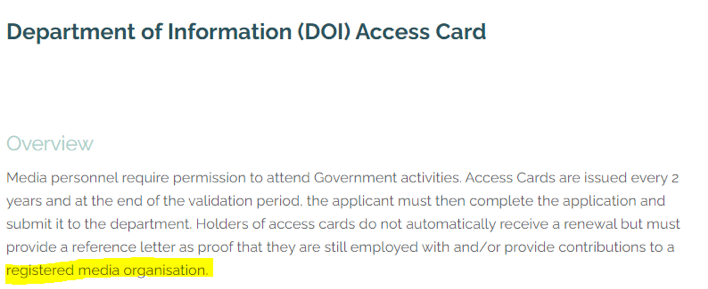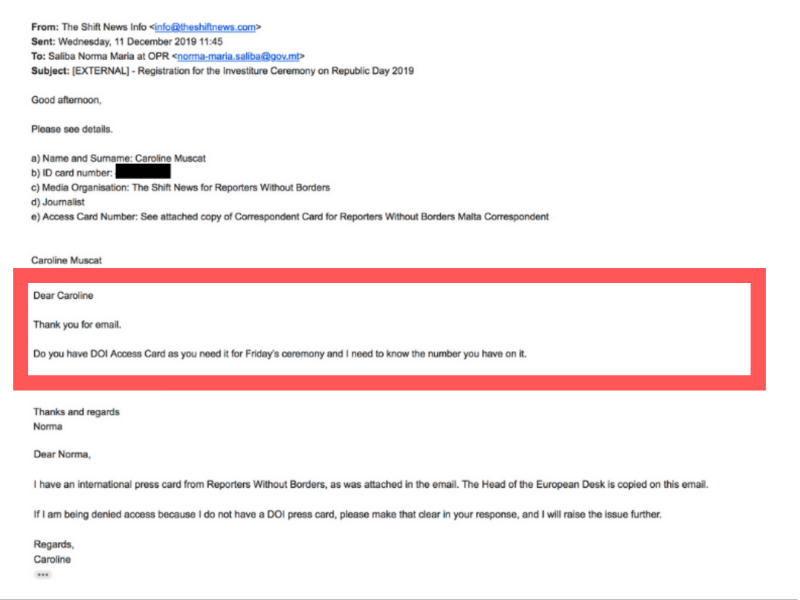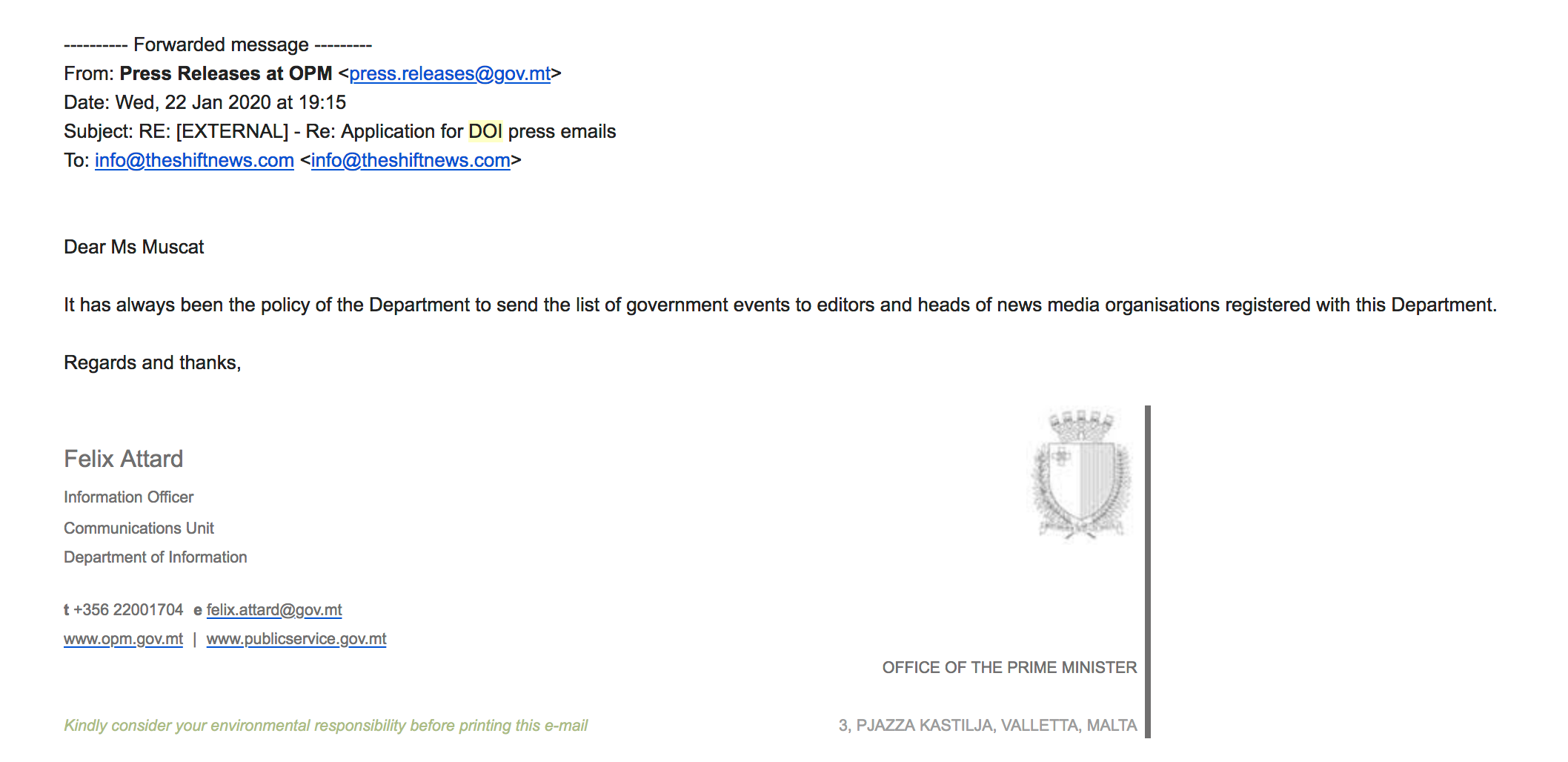The government’s Department of Information has issued a statement claiming to “rectify some points” made in my submissions to the public inquiry Board on Wednesday. Since the DOI is conflating a number of issues, this statement addresses the points raised. The correspondence with the DOI will also be handed to the Board of the public inquiry in full.
I raised two issues: (a) inclusion on (or rather arbitrary exclusion from) the DOI’s press mailing list and (b) issuance of (or lack of) Access Cards, these are two separate matters.
The first, inclusion in the press list, is self-explanatory. The Shift newsroom did not receive the government statement, and neither did I. The fact that certain journalists and newsrooms are excluded from the press list for government statements and functions is precisely one of the issues I raised in my testimony before the Board of the public inquiry. The irony seems to have been missed by the DOI in making a statement about my submission while failing to send it to me or to The Shift newsroom.
The DOI argues that it makes certain press releases and events lists public but it fails to mention that accessing these hours late (if not days, and sometimes not at all) is useless to a media organisation. We cannot write investigative pieces or ask difficult questions if all we know is that Minister X or Y spoke somewhere yesterday. The fact that DOI tries to ignore this concern, worse try to conflate issues to sow doubt about an Editor’s testimony, is in itself yet another assault on press freedom.
To make matters worse, after excluding The Shift from the statement sent out, the DOI proceeded to send The Shift a Right of Reply, after it had made its own statement public.
A Right of Reply is intended for individuals (not government) whose reputation may have been hurt by a contested article. It obliges the news organisation to publish the response in full, within 48 hours and with the same prominence as the original article – something the DOI keeps demanding from The Shift.
The department has no trouble finding the newsroom when it comes to the regular stream of Right of Replies sent in.
The Shift does not intend to publish the DOI’s statement as a Right of Reply, since the article to which it refers, ‘State-sponsored trolling continued even after Caruana Galizia’s death’ was a bona fide report on court proceedings.
DOI’s statements on press passes and access cards, however, do need to be addressed because access to government members and functions is key for a news organisation to do its job. We can’t ask questions to Ministers if we are denied access and if emails sent with questions remain unanswered… until we get a Right of Reply from the DOI.
DOI states: “The Department of Information does not issue Press Cards. It only issues Access Cards which are used for government events only. DOI access cards are issued upon the endorsement of the editor/head of news of the particular media organisation. It is the editor/head of news of the media organisation concerned (and not the Department) who determines whether the applicant is a journalist. The Department always leaves the authenticity of the endorsement to the editor/head of news.”
I do not need a government press card. I hold an international press card. I am also the Head of a news organisation. If the government bars access based on the need for registration, then it is a condition and not a voluntary process.
Changes to the press law removed the obligation to register, and yet the department of information maintains the requirement. A look at the DOI’s own website’s guidelines for Access cards clearly still indicates that “registration” is a requirement: 
DOI states: “The Department has never denied an Access Card for government events to any media organisation, registered or not.”
The Shift was denied access to Republic Day events in December 2019 when the President’s Office insisted that journalists must apply for a government Access Card for approval before a further layer of approval by the President’s Office. The correspondence is being published below.
An international press card is valid in any country. The additional layers required for access to government press conferences and other events are those imposed by the government in Malta.

Reporters Without Borders had reacted strongly to access being denied. “It adds to press freedom concerns in the country when journalists are excluded from activities at a time when answers are demanded in the public interest,” Head of EU Desk, Pauline Ades-Mevel, said. “This is unacceptable.”
DOI states: “The Department of Information never insisted with online portals to register. Indeed, the many news portals which voluntarily opted to register were informed a priori by the Department that registration is voluntary according to the Media and Defamation Act.”
If the DOI excludes a news organisation from receiving information unless it registers then it is not a voluntary process at all. It is a condition imposed by the DOI for recognition and access.
In correspondence with The Shift only last week, the DOI said, “It has always been the policy of the department to send the list of government events to editors and heads of news media organisations registered with the department” (published below).
While the DOI claims it “never insisted with online portals to register” it refuses access to those who don’t. It maintains this “policy” despite changes to the law that removed the obligation of registration, effectively leaving the situation unchanged (email is being reproduced below).

The Council of Europe report on Malta referred to this problem saying it had “a chilling effect” on journalism, resulting from the arbitrary use of administrative measures such as registration and accreditation schemes in order to harass journalists or to frustrate their ability to contribute effectively to public debate.
The recommendation by the Council of Europe states: “Press or union cards, relevant accreditation and journalistic insignia should be accepted by State authorities as journalistic credentials, and where it is not possible for journalists or other media actors to produce professional documentation, every possible effort should be made by State authorities to ascertain their status.”
Such recommendations are politically binding, which means they are frequently cited by the European Court of Human Rights.













